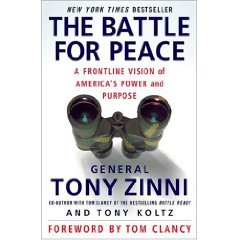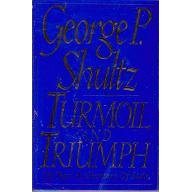I have known over fifty flag officers in my time, and only a handful have actually been world-class, including Zinni, Gray, Stackpole in the USMC, Clapper and O'Lear in the USAF, Studeman in the Navy, and of course Schoomaker in the Army. No doubt there are others, but in my experience most flag officers have simply won a beauty/etiquette contest, and they do not acquire any additional strategic vision upon being promoted from the lower ranks. Zinni is incontestably the one general we have that has done three things brilliantly:
1) been a foxhole Marine with grievous wounds and innovative leadership at the company and field grade levels (see my review of his book “Battle Ready”);
2) been a general deeply experienced in Operations Other than War (OOTW–what a stupid former Chairman of the Joint Chiefs of Staff once said of “Real men don't do OOTW–which is about as stupid as the DNI still saying (we paraphrase) “we're in the business of secrets for the President, the hell with open sources and everyone else”); and
3) been a true inter-agency Commander-in-Chief (CINC) able to make full use of *all* the inter-agency capabilities, not just the military, and done so diplomatically and personally. He is the George Shultz (himself a former Marine) of the current warrior class.
With that as pre-amble, here are the highlights of the book that demand its reading by every citizen in time to challenge their light-weight (and generally corrupt) Members of Congress prior to casting a vote in November 2006:
1) Chapters 1-7 are essentially an overview of reality and why global reality impacts on America's security and fortune. This is required reading for all but a handful, and needs to be read very slowly and carefully by those encumbered with ideological filters. As the author notes, very often perception is reality, and when an ideologically-biased perception conflicts with actual multi-cultural reality, what you get is a catastrophe such as Iraq.
2) The heart of the book is the author's prescription for achieving both an unbiased view of the real world, and the ability to fully plan for and leverage all the sources of national power as represented by the varied agencies, through three simple and elegant “hubs”:
2a) At the national level, a National Monitoring and Planning Center (NMPC) that is able to integrate both intelligence (less than 20% of the relevant information) and operational inter-agency information (the other 80%), and to then plan, coordinate, and guide the execution of long-term inter-agency campaign plans.
2b) At the operational level, the modification of the currently planned Joint Intelligence Operations Commands or Centers (JIOC) to turn them into more of a Joint Inter-Agency Collaboration Center (JICC) such as SOCOM has developed in concept. Although JFCOM's Joint Inter-Agency Coordination Group (JIACG) is the example used by the author, I believe that we actually need to bring together the JFCOM and SOCOM concepts with those emerging in the NORTHCOM inter-agency directorate under Bear McConnell, and the Global Innovation and Strategy Center (GISC) at STRATCOM, which not coincidentally also has the lead for getting a grip on all open source information in all languages all the time, something the DNI cannot provide.
2c) At the tactical level the author is right on target when he proposes the civil affairs model (as does Congressman Rob Simmons, R-CT-02 from the HASC and Homeland Security Committees) as the focal point for inter-agency application of resources in-country. The author does not dismiss the U.S. Embassy, which was supposed to play that role, but his book is a clear demarche with respect to the incapacity of the Department of State to provide a leadership role, a planning role, or an inter-agency management role in-country. The Embassies are simply not working the way they are supposed to our could be made to work.
3) The author concludes his work with an analogy of cobras being killed by the death of a thousand stings from bees. Exactly right. The threat to America is NOT Iranian nuclear power (just as it was NOT Iraqi Weapons of Mass Destruction) but rather a global concerted effort to destroy Americas economy through the simple expedient of putting oil prices up to $300 a barrel, something that can be achieved very inexpensively with tiny but potent attacks on key oil pipelines and pumping stations in Nigeria, Venezuela, and Saudi Arabia.
Tony Zinni is one of my heroes. He not only understands asymmetric warfare and the urgency of getting serious (that is to say, professional, which we are not at this time) about global instability in the intangible non-military dimensions, but he is a clear-headed diplomat and warrior-philosopher who knows how to make big bureaucracies do his bidding.
I hope the day comes when we have a chance to work together to save this great Republic from the morons that have broken the piggy bank, cost us all moral legitimacy in the eyes of the world, and started a 100 year six front war we did not need and were not ready for.
BRAVO ZULU and GUNG HO.
Admin Note: If you select “see my other reviews” and bookmark that page, you can, over the course of several hours, receive a free graduate education in reality and non-fiction about global issues. If Zinni *had* had footnotes, most of the books I have reviewed would have been in his book as supporting elements for his personal and professional essay.









